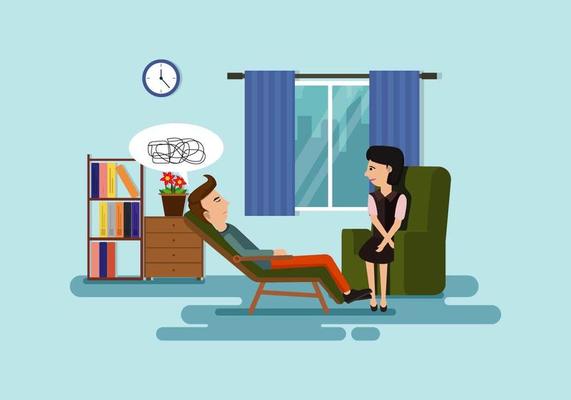Why the Best Psychologist in Delhi Can Transform Your Psychological Wellness
Why the Best Psychologist in Delhi Can Transform Your Psychological Wellness
Blog Article
Psych Treatment: A Comprehensive Guide to Techniques and Results

Cognitive-Behavioral Treatment
Cognitive-Behavioral Treatment (CBT) is an extensively used psychotherapeutic technique that focuses on identifying and changing inefficient reasoning and actions patterns. Developed in the 1960s by Aaron T. Beck, CBT combines behavior and cognitive concepts to resolve different psychological health and wellness issues, consisting of anxiety, stress and anxiety, and stress-related conditions.
Techniques such as cognitive restructuring, exposure treatment, and skill-building workouts are frequently utilized. Cognitive restructuring involves challenging and altering negative idea patterns, while direct exposure therapy aims to lower anxiety and anxiousness with gradual direct exposure to been afraid things or scenarios.
Evidence-based research study supports the efficiency of CBT for a large variety of psychological disorders - Best Psychologist in Delhi. Its emphasis on skill acquisition and self-help strategies equips clients to proceed development independently after treatment ends. The versatility and effectiveness of CBT have actually made it a foundation in modern psychotherapeutic method
Psychodynamic Approaches
Rooted in the very early theories of Sigmund Freud, psychodynamic approaches concentrate on exploring the subconscious mind and its influence on actions and emotions. These approaches aim to reveal covert ideas and sensations that may be driving maladaptive behaviors and psychological distress. Central to this technique is the concept of internal problem, frequently stemming from unresolved previous experiences, specifically those from youth.
Therapists utilizing psychodynamic methods use several essential methods, consisting of complimentary association, where people are encouraged to talk openly to reveal unconscious product, and desire analysis, which interprets the latent material of desires. Additionally, the expedition of transfer and countertransference characteristics within the restorative relationship is important. These communications can offer insights right into the individual's interior globe and relational patterns.
Psychodynamic treatment is generally longer-term compared to other methods, providing a deep and thorough understanding of the individual's mind. Research study shows that it can be specifically effective for complex mental health problems, such as character conditions and persistent anxiety. By promoting self-awareness and psychological understanding, psychodynamic treatment looks for to bring unconscious material to consciousness, enabling individuals to achieve long lasting and meaningful change in their lives.
Humanistic Techniques
Structure on the structures laid by psychodynamic techniques, humanistic methods offer a distinctive viewpoint concentrated on private possible and self-actualization. Stemming in the mid-20th century, these techniques focus on the fundamental benefits and development potential of individuals, stressing a holistic sight of human experience. Secret numbers such as Carl Rogers and Abraham Maslow have dramatically affected this restorative method, which includes approaches like client-centered treatment and Gestalt treatment.
Client-centered therapy, developed by Rogers, plays a crucial duty in humanistic methods. The therapist's role is even more of a facilitator than an authority, encouraging clients to harness their inner resources for recovery.
Gestalt treatment, an additional crucial humanistic method, emphasizes existing minute understanding and the integration of body and mind. By concentrating on the "present moment," customers acquire greater understanding right into their current emotions and actions. Techniques such as role-playing and directed visualization are frequently used to aid customers obtain a deeper understanding of themselves, inevitably leading to improved self-awareness and satisfaction.
Integrative Therapies
Integrative treatments stand for a synthesis of numerous therapeutic methods customized to fulfill the unique requirements of each customer. This approach acknowledges the intricacy of human psychology and the diverse nature of mental health concerns. By combining aspects from different colleges of psychiatric therapy-- such as cognitive-behavioral treatment (CBT), psychodynamic treatment, and humanistic strategies-- integrative therapies supply a more holistic and versatile view treatment paradigm.
Experts of integrative treatment analyze each customer's particular needs, symptoms, and individual background to develop a customized therapy plan. This customized method enhances the potential for therapeutic success by addressing the root causes of emotional distress and advertising total wellness. Techniques might consist of mindfulness workouts, cognitive restructuring, and emotional handling, each chosen to target various facets of the customer's concerns.
Moreover, integrative therapies highlight the healing partnership, watching the client-therapist bond as an essential part of reliable treatment. This connection cultivates an encouraging environment where customers really feel secure to explore and resolve their worries. The adaptability of integrative therapies makes them appropriate for a broad series of conditions, including anxiousness, anxiety, injury, and interpersonal difficulties, consequently enhancing their applicability and effectiveness in diverse clinical setups.

Gauging Treatment Results
Assessing the effectiveness of psychiatric therapy is vital for both clinicians and customers to guarantee that the therapy is producing the wanted blog here results. To achieve this, different techniques and devices are used to determine treatment results methodically. Standard evaluation tools, such as the Beck Depression Supply (BDI) and the Generalized Anxiousness Disorder 7 (GAD-7), supply measurable information on sign extent and read adjustments with time.
In addition to standard devices, qualitative techniques like customer self-reports and clinical interviews provide valuable insights right into the personal experiences and regarded progress of clients. Regularly arranged examinations, typically at the beginning, navel, and end of therapy, help in tracking the trajectory of enhancement or determining locations requiring change.
Outcome measurement is not limited to sign decrease; it additionally includes functional improvements in every day life, such as better social connections, raised job efficiency, and boosted overall wellness. Modern innovations in electronic health have introduced mobile apps and online systems that facilitate real-time monitoring and feedback, further refining the analysis procedure.
Eventually, a detailed technique to gauging treatment results guarantees that therapeutic treatments work, efficient, and tailored to fulfill the specific demands of clients, thus optimizing the overall therapeutic experience.
Conclusion
Humanistic strategies focus on individual growth and self-actualization, while integrative treatments combine numerous methods for customized therapy plans. Reviewing therapy results via qualitative techniques and standard analyses guarantees a detailed understanding of effectiveness, ultimately assisting customers toward enduring mental health improvements.
From the organized technique of Cognitive-Behavioral Treatment (CBT) to the deep exploration of the unconscious in psychodynamic therapy, each technique brings one-of-a-kind benefits. Its emphasis on skill acquisition and self-help methods encourages clients to continue progress independently after therapy ends (Best Psychologist in Delhi). Trick figures such as Carl Rogers and Abraham Maslow have substantially affected this healing strategy, which encompasses methods like client-centered therapy and Gestalt therapy

Report this page